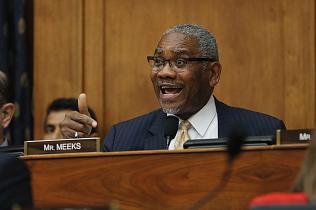New York City's once-powerful Democratic bosses sit out mayor’s race
NEW YORK — When Alexandria Ocasio-Cortez toppled Queens party boss Joe Crowley in 2018, it marked a new low for the local Democratic machines that once held sway over New York City politics.
Now, the party organizations in the city’s boroughs can’t even get behind a candidate for one of the most important mayoral contests in recent memory.
Brooklyn Borough President Eric Adams, a leading candidate among more than two dozen people seeking the Democratic nomination for mayor, made a hard sell for the Queens party nod. Borough pride be damned, Adams stared into the camera on a recent weeknight and declared himself the “Queens candidate.”
“We have heard reported over and over again that there is not a Queens candidate running for mayor. That is not true. I am the Queens candidate,” Adams, who grew up in Queens, told its Democratic county organization at a virtual forum earlier this month. “This is a borough that is dear to my heart.”
Two weeks later, Rep. Greg Meeks, who runs the Queens Democratic party, announced the organization’s district leaders had not reached consensus around a single candidate and would skip endorsing in the race to replace outgoing Mayor Bill de Blasio. His counterparts in Brooklyn and the Bronx are charting a similar path — all three so far declining to get behind any of the contenders four months before the June 22 primary.
The abdication by the county parties — which at one time had viable organizations in three of the city’s five boroughs — marks another demonstration of the local Democratic organizations’ recession from their once-powerful role at the center of New York City politics.
No longer are party leaders able to corral — or dictate, depending on one’s perspective — votes for citywide candidates, leaving them without position in one of the most consequential local elections in modern memory.
“The counties are in a very difficult, if not impossible, position,” said city-based lobbyist George Fontas, who hails from South Brooklyn. With four months to go, the field is too crowded and too uncertain — the unavoidable consequence of a new campaign finance system and ranked-choice voting — to confidently pick a winner, he reasoned.
With a crucial deadline coming up to get on the ballot, the parties are likely to sit out one of their most important roles in the city’s electoral process.
“Time is running out and is of the essence,” said Jason Laidley, chief of staff to Bronx Democratic leader and state Sen. Jamaal Bailey, referring to the March 2 start of collecting signatures to secure a spot on the ballot. The local party has still not gotten behind a candidate.
In Brooklyn, Democrats are mired in a civil war between old-guard allies and left-leaning reformers. The breach has stalled an endorsement of Adams, even as the county party’s lawyer openly supports the borough president’s campaign.
A spokesman for the party, George Arzt, said it is “simply too early for county party leaders to endorse mayoral candidates” and added they are “grappling with the ravages of the pandemic” and too focused on constituent services to endorse until later in the cycle.
Discord in the Brooklyn Democratic party has become so severe it led to a 13-hour virtual showdown in December, captured in video snippets of party elders silencing reformers by automatically muting their mics. The standoff over the party’s byzantine bylaws is now in the hands of the courts.
Meeks, who is reportedly fond of Wall Street executive Ray McGuire in the mayor’s race, is wrestling with several divisions in Queens, including a bloc of support for Adams countered by a growing presence of far-left activists more inclined to back a politically concordant candidate, according to several people familiar with the matter.
“I don’t understand why the parties would not embrace these movements of new blood,” Derek Evers, a district leader in Queens’ Ridgewood and Long Island City neighborhoods, said in an interview.
In the Bronx, Bailey is finding his footing following a leadership shakeup last year. Shortly after Borough President Rubén Díaz Jr. dropped out of the mayoral race, party chair Marcos Crespo stepped down and opted not to run for reelection to the state Assembly. Bailey has been calling district leaders and politicians to assess their preferences in the upcoming primary but has found little consensus, Laidley said.




